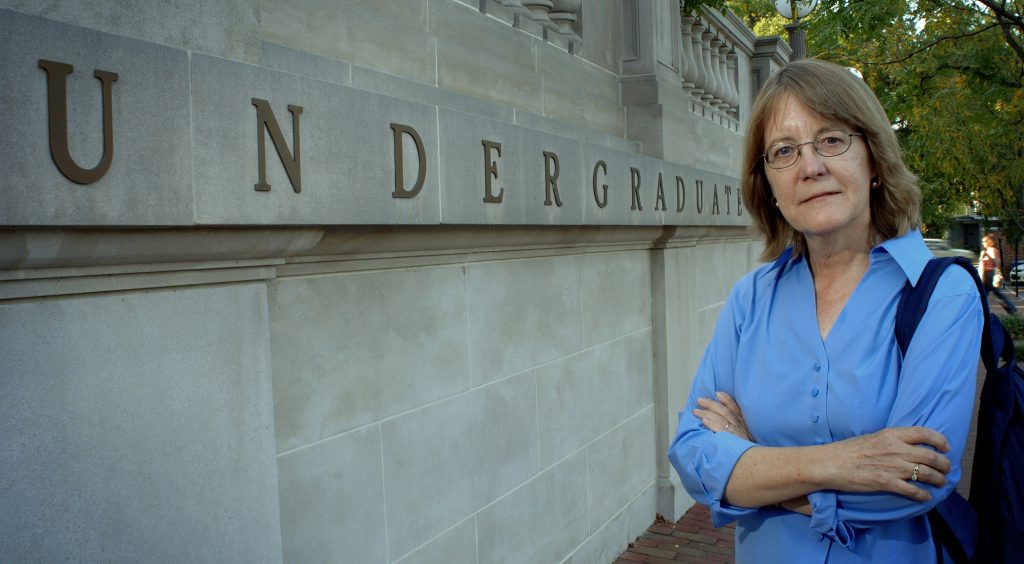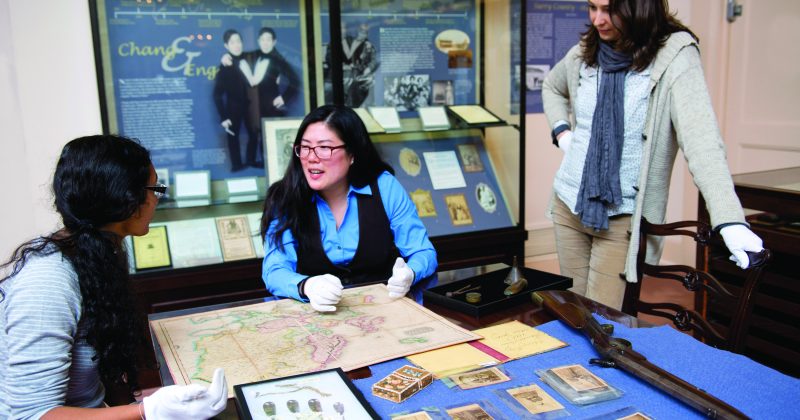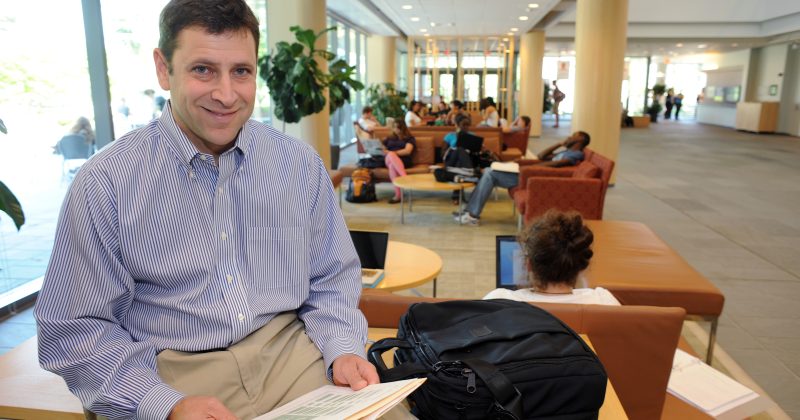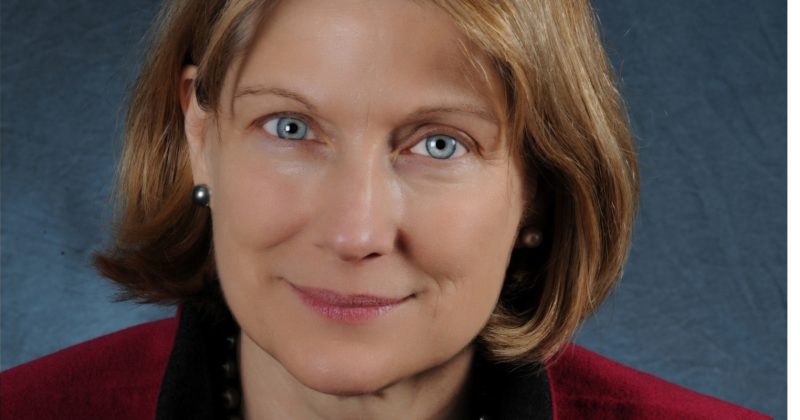
Pat Pukkila has founded and directed the Office for Undergraduate Research at Carolina for the past 14 years. (photo by Dan Sears)
Click on the links at the bottom of this story for more features on creative teaching and learning in the College.
On a cold winter night in 1979, Pat Pukkila woke up at 3 a.m., turned to her husband and said, “Honey, I have to go into the lab.” A biology postdoc at Harvard, Pukkila knew that after many months, the results of her experiments, designed to show how bacteria correct mistakes made when DNA is copied, would be readable. As she recalls seeing the results, she is nearly moved to tears 34 years later.
“I can still feel the hairs rise on the back of my neck,” Pukkila said. “A problem is so simple once you understand it. It’s such a thrill to know something that no one else yet knows.”
Ensuring that undergraduates at Carolina have the opportunity for that same thrill of discovery has been the focus for the past 14 years for Pukkila, professor of biology and director of Carolina’s Office for Undergraduate Research (OUR). As the office’s founding director, Pukkila has transformed the Carolina undergraduate academic experience. She has been at UNC for 34 years.
“Pat’s leadership has helped build on campus a culture that supports discovery-based learning,” said Donna Bickford, associate director of OUR. “Students who have participated in an undergraduate research program see themselves as knowledge producers not just knowledge consumers. This experience transforms not just their education but how they think of themselves.”
That transformation was what Pukkila hoped to achieve.
“My goal was to change the culture surrounding undergraduate involvement in creative original work,” she said. “I am proud to say that we have achieved that, and that we are the first public university to bring undergraduate research to scale in the curriculum.” In fact, 65 percent of graduating seniors received academic credit for undergraduate research in 2011-2012.
Colleagues say that Pukkila’s passion, creativity and commitment have led to the success of undergraduate research at Carolina.
“Pat’s personal commitment to undergraduate research has been parlayed into an institutional commitment to doing this,” said Bobbi Owen, senior associate dean for undergraduate education. “Pat is a pretty self-effacing person, so the work she does is never about her; it’s always about the students.”
***

Throughout Pukkila’s tenure as director — which will end this June upon her retirement — her innovations have extended the depth and breadth of undergraduate research opportunities. The Graduate Research Consultant (GRC) program, which celebrated its 10th anniversary last December, is just one example. GRCs are graduate students who provide support to faculty by guiding undergraduates through their research projects from beginning to end.
Ginnie Hench, a postdoc who works in Pukkila’s lab, says that her experience as a graduate research consultant enabled her to be more effective in teaching her own seminar this semester.
“Being a GRC gave me the opportunity to see how someone else runs a seminar in the biology department,” said Hench. “The program gives graduate students the ability to mentor undergraduates and, at the same time, learn from the professors they assist.”
Bickford says that one mark of the success of the GRC program is that in the last 10 years, more than 750 GRCs have helped faculty in at least 700 courses provide research experiences to more than 21,000 undergraduate students. “Students who don’t even know they are interested in research have this opportunity because of Pat’s innovation,” she said.
Mallory Melton ‘14 is just one student who is grateful for the opportunities presented by the OUR. Last summer, Melton received a Summer Undergraduate Research Fellowship (SURF), a competitive grant which enables students to complete summer research projects developed with a faculty mentor. Melton’s fellowship allowed her to collect and study sandstone samples in Mississippi and then travel to Washington, D.C., where she compared them to samples in the National Museum of the American Indian and the National Museum of Natural History.
“I knew that I was able to memorize facts and think about archaeological sites in a lower level way,” she said. “But this challenged me and made me realize how much I enjoy the process of higher level thinking.”

Melton said that the experience solidified her interest in anthropology and cemented her desire to pursue entrance into a Ph.D. program in her field immediately after graduation. “This experience made me feel like an independent scholar who has a future in research,” she said.
Wanting to encourage other undergrads to get involved in research, Melton serves as an OUR Ambassador, a program Pukkila helped to create.
“We make presentations in classrooms and residence halls, places where students feel comfortable,” Melton said. “We help make students feel that undergraduate research isn’t frightening but instead, something they can embrace and excel at.”
***
Wanting to ensure that first-generation college students and other potentially underserved students have access to research opportunities, Pukkila successfully applied for a grant from the Howard Hughes Medical Institute.
“I wanted to put into place a program that could be woven into the fabric of Carolina and serve the students who weren’t applying for summer fellowships at rates that one would have expected,” said Pukkila.
Pukkila’s impact also extends to faculty. Donald Oehler, a professor of music at Carolina, said that Pukkila helped him redefine what research is.
“My main role on campus is as a studio teacher, so I was perplexed when Pat asked me to get involved with this initiative,” he said. “She said, ‘Au contraire; everything you do is research.’” Oehler said that Pukkila has inspired him to be creative in how he has students approach projects and conduct research.
He also said that she has helped create a more cohesive academic community. “We’re up in the northwest corner of campus and are not always that involved in the rest of the campus,” he said. “Pat has been able to pull some of us out of that and bring us into the campus at large. I can’t emphasize enough how important that is because it broadens our experience on campus, and makes us better teachers and performers.”
Oehler also knows Pukkila as a musician and says that her strengths serve her as both a flutist and an administrator. “She is a fine flutist who is a loyal and strong member of the Philharmonia, the orchestra I conduct,” he said. “She is flexible, easy to work with and welcomes criticism so that she can improve.”
In addition to being an accomplished musician and administrator, Pukkila is a highly regarded scientist. Her lab has pioneered the use of the mushroom Coprinus cinereus (recently renamed Coprinopsis cinerea) as a model system for investigating chromosome dynamics during meiosis, the cell division process necessary for sexual reproduction.
Pukkila’s reputation extends well beyond the perimeter of campus.
“Pat is seen as someone who has done some of the most important and exciting work in our field,” said Janice DeCosmo, associate dean, undergraduate academic affairs and director of the undergraduate program at the University of Washington. “What I think is unique about Pat is that she is a biologist as well as a really inspired and inspiring administrator. She values being a faculty member and also has the ability as an administrator to effect change for more than just her immediate colleagues and students.”
Bickford added: “Pat is the most articulate and passionate person I have ever heard speak about the power of inquiry. She believes that inquiry is not only a linchpin to the development of individual students but also in the development of an educated and curious citizenry.”
After helping shape so many lives, Pukkila isn’t sure what her retirement will look like. “I’m not somebody who has a whole list of unfulfilled ambitions,” she said. “I have many interests so I’m looking forward to the time and space to see what will happen next.”
[Story by Michele Lynn]
Read more stories on creative teaching and learning, part of the package “Learning 2.0″:
Intro to entrepreneurship (super course)
Interactive psychology instruction
Physics inside out
When literature and history leap off the page
Published in the Spring 2013 issue | Features
Read More

When literature and history leap off the page
Heidi Kim believes in having her students create projects that…

Top honor for health adviser
Daniel Gitterman, associate professor of public policy, was awarded the…


